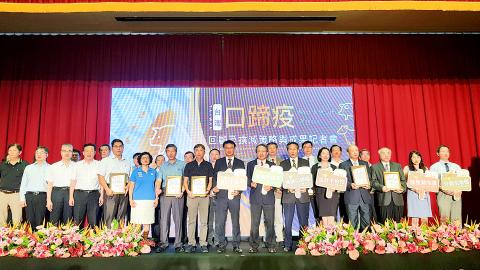The Council of Agriculture (COA) yesterday announced that foot-and-mouth disease has been eliminated from Taiwan, as no case had been detected in the past year, without vaccination, 23 years after an outbreak put a halt to the nation’s pork exports.
“I hereby announce that Taiwan, Penghu and Matsu have succeeded in ‘pulling the vaccine needles’ [prevention without vaccination],” COA Minister Chen Chi-chung (陳吉仲) told a news conference in Taipei.
The council would apply by September for the nation to be removed from the World Organization for Animal Health’s (OIA) list of foot-and-mouth disease-free zones where vaccination is practiced, which would mean it could officially declare itself to be free of foot-and-mouth disease next year, he said.

Photo: CNA
The 1997 outbreak stopped the export of pork products to Japan, and in the years since then, the number of pigs raised in Taiwan fell from more than 10 million to about 5 million, while the number of pig farms plunged from about 25,000 to 7,200.
The outbreak cost the industry about NT$170 billion (US$5.5 billion at the current exchange rate), he said.
COA Deputy Minister Huang Chin-cheng (黃金城) said the outbreak in Taiwan began on March 20, 1997, and the timing and virus strain detected suggested that the source was China.

Photo: Chien Hui-ju, Taipei Times
Lower pork and pig prices in China resulted in people smuggling piglets from China to the Hsinchu (新竹) area, he said.
Within a few months, foot-and-mouth disease spread across the nation, causing pork prices to collapse as consumers shunned pork products, while the military was called in to help bury massive numbers of culled pigs, Huang said.
Although pigs culls and vaccinations had been used to prevent the spread of the disease, a “pulling the needles” trial in 2009 failed as the disease erupted again as soon as vaccinations stopped.
However, no cases have been reported since the nation stopped vaccination on July 1 last year, so hopefully the nation will be declared as a foot-and-mouth disease-free zone by the OIA in May next year, he said.
The key to the success was that the vaccination rate was more than 90 percent before vaccination was stopped last year, and annual tests for antibodies against the virus have been conducted on 1,860 pig farms and more than 40,000 pork product items, the results of which showed that the antibody rate was more than 85 percent, he said.
The vaccination program was stopped after monitoring found that pigs without antibodies against the virus did not get infected after living with other pigs on farms for more than 18 hours, he added.
The success was due to the government’s insistence on the policy, cooperation from the industry and the effective implementation of related technology, Huang said.
Chen said the council hopes Taiwan’s pork products will still be mainly provided to the domestic market, as about 5 to 10 percent of demand relies on imported pork, which has become more expensive with the outbreak of African swine flu in China and other nations.

AGING: As of last month, people aged 65 or older accounted for 20.06 percent of the total population and the number of couples who got married fell by 18,685 from 2024 Taiwan has surpassed South Korea as the country least willing to have children, with an annual crude birthrate of 4.62 per 1,000 people, Ministry of the Interior data showed yesterday. The nation was previously ranked the second-lowest country in terms of total fertility rate, or the average number of children a woman has in her lifetime. However, South Korea’s fertility rate began to recover from 2023, with total fertility rate rising from 0.72 and estimated to reach 0.82 to 0.85 by last year, and the crude birthrate projected at 6.7 per 1,000 people. Japan’s crude birthrate was projected to fall below six,

US President Donald Trump in an interview with the New York Times published on Thursday said that “it’s up to” Chinese President Xi Jinping (習近平) what China does on Taiwan, but that he would be “very unhappy” with a change in the “status quo.” “He [Xi] considers it to be a part of China, and that’s up to him what he’s going to be doing, but I’ve expressed to him that I would be very unhappy if he did that, and I don’t think he’ll do that. I hope he doesn’t do that,” Trump said. Trump made the comments in the context

SELF-DEFENSE: Tokyo has accelerated its spending goal and its defense minister said the nation needs to discuss whether it should develop nuclear-powered submarines China is ramping up objections to what it sees as Japan’s desire to acquire nuclear weapons, despite Tokyo’s longstanding renunciation of such arms, deepening another fissure in the two neighbors’ increasingly tense ties. In what appears to be a concerted effort, China’s foreign and defense ministries issued statements on Thursday condemning alleged remilitarism efforts by Tokyo. The remarks came as two of the country’s top think tanks jointly issued a 29-page report framing actions by “right-wing forces” in Japan as posing a “serious threat” to world peace. While that report did not define “right-wing forces,” the Chinese Ministry of Foreign Affairs was

PREPAREDNESS: Given the difficulty of importing ammunition during wartime, the Ministry of National Defense said it would prioritize ‘coproduction’ partnerships A newly formed unit of the Marine Corps tasked with land-based security operations has recently replaced its aging, domestically produced rifles with more advanced, US-made M4A1 rifles, a source said yesterday. The unnamed source familiar with the matter said the First Security Battalion of the Marine Corps’ Air Defense and Base Guard Group has replaced its older T65K2 rifles, which have been in service since the late 1980s, with the newly received M4A1s. The source did not say exactly when the upgrade took place or how many M4A1s were issued to the battalion. The confirmation came after Chinese-language media reported